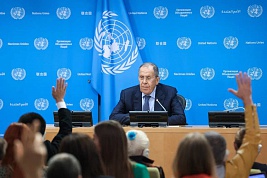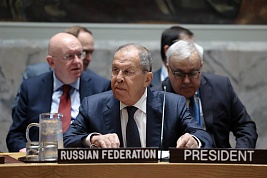Comment by the Information and Press Department on German Federal Minister for Foreign Affairs Heiko Maas’s visit to Russia
On May 10, German Federal Minister for Foreign Affairs Heiko Maas will visit the Russian Federation. He is expected to hold talks with Acting Foreign Minister Sergey Lavrov. This is Mr Lavrov’s first meeting with Mr Maas since his appointment as German federal minister in March 2018.
During the talks the officials plan to discuss practical issues of bilateral ties. They also plan to exchange views on pressing international issues, including the implementation of the Minsk Agreements on settling the domestic crisis in Ukraine, cooperation in the Normandy format in this context, settlement of the armed conflict in Syria and the struggle against terrorists there, promotion of the peace process in Libya, the situation in the Middle East, issues around the inter-Korean dialogue and the Iranian nuclear programme.
Despite the slow development of the political dialogue initiated by Berlin in the past few years, Russian-German relations retain their inherent importance. We regard as positive the interest of the new German coalition government in maintaining substantive and open dialogue, consolidating trade, economic and investment cooperation, and broadening bilateral cultural, humanitarian and public ties.
Despite the sanctions-imposed restrictions, Germany still remains Russia’s important trade and economic partner. Since the beginning of 2017, trade and investment have been steadily growing. The Russian-German Working Group on Strategic Cooperation in the Economy and Finances that will hold its regular plenary session in order of precedency in Russia is playing its role in ensuring this positive dynamic.
According to the Federal Customs Service, in 2017 Russian-German trade grew by 22.8 per cent over 2016 to almost $50 billion. According to the Bank of Russia, the aggregate amount of cumulative German investment exceeds $18 billion. About 5,000 companies with German capital are present in Russia. There are some 1,500 companies with Russian capital in Germany, while the total amount of direct Russian investment in Germany is about 3.2 billion euros.
According to a poll conducted by the Russian-German Chamber of Commerce last April, 70 per cent of German companies in Russia intend to continue their operations here, while 20 per cent plan to increase their turnover and investment.
Energy remains a major component of our economic cooperation. The new German Government supports the Nord Stream-2 gas pipeline project, considering it to be an economic initiative that helps diversify natural gas distribution routes to Europe and minimise transit risks. German regulators have given Russia the required permits to lay the gas pipeline through German territory.
The two countries are productively carrying out projects in the context of the 2017−2018 Cross Year of Regional and Municipal Partnerships. The municipalities and regions of both countries are increasingly interested in establishing partnerships. Such events are important for building mutual trust and preventing alienation between Russians and Germans. The closing ceremony of this Cross Year is scheduled to take place on September 14 in Berlin.
Russia and Germany are preparing to hold a Cross Year of Scientific and Educational Partnerships in. The theme of this year is particularly important considering the implementation of numerous high-tech joint projects and the elaboration of a roadmap of bilateral cooperation in fundamental and applied research in the next decade.
Bilateral cultural and humanitarian ties remain traditionally close. In 2019 Germany plans to host a large concert programme “Russian seasons.” It has aroused the intense interest of the German public. German authorities at various levels are providing support to the organisers.
The two countries are paying special attention to close dialogue between their civil societies. In this context, they primarily focus on ensuring the rhythmic work of the St Petersburg Dialogue bilateral public forum that will meet in Moscow next November (the meetings are held interchangeably). Preparations for the Potsdam meetings dialogue venue in May are nearing completion.


